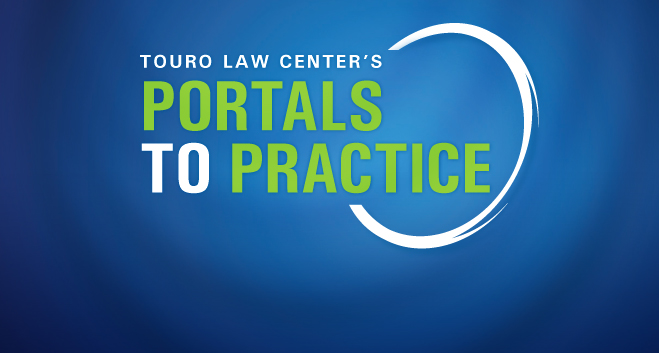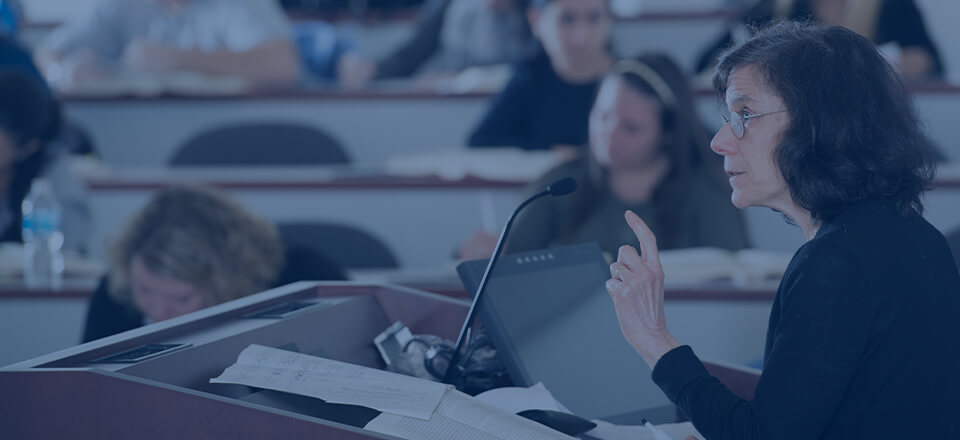Portals to Practice<br/>
About

Portals to Practice
Touro Law Center Announces Portals to Practice: A Five-Year Strategic Plan to Restructure Legal Education
Touro Law Center has implemented a five-year strategic plan, Portals to Practice, a cutting-edge program that reconceives and restructures the law school experience. The Portals to Practice expands the scope and quality of legal education by focusing on the development of legal professionals, from pre-law through post-graduation.
Dean Patricia Salkin stated, “The Portals to Practice is an innovative plan that responds to changes in the legal market over the past several years, addresses calls for reform in legal education and is consistent with Touro Law’s values and core mission. This plan places Touro Law at the forefront of legal education in this country.”
Each of the portals prepares Touro Law students for the practice of law by integrating the knowledge, skills and values learned in law school classrooms with experiential opportunities that encourage students to develop and apply to the real world what they’ve learned inside the walls of law school. The traditional continuum of legal education is transformed from a chronological sequence of learning to a multidimensional portal to the profession. At the center of the portals is an innovative curriculum that provides Touro Law students with immersive and sequential programs in diverse fields of practice. Over the course of their legal education, from their admission to law school through their admission to the bar, Touro Law students will be engaged in increasingly complex practice activities. The portals are designed to contemporaneously expose students to sequenced coursework and practice opportunities that correlate with the level of doctrinal and skills development students have achieved. The curricular offerings embedded into the portals positions our students to enter the legal profession competently and confidently in a range of settings, including private practice in a solo, small or large firm, public interest organization, government office, or a law-related field where a J.D. is preferred.
“The changes that Touro Law will be implementing address the need for law schools to be able to teach students the substance of the law while also teaching them the craft of lawyering,” said Frederick C. Johs, Partner at Lewis Johs Avallone Aviles, LLP. “I am confident that this strategic plan will result in Touro Law graduates who are ready to serve clients and be productive and successful members of this noble profession.”
Touro Law’s commitment to excellence in teaching, scholarship and service on the part of our faculty, to professionalism and dedication to service on the part of our students and alumni, to access to a legal education for all qualified students, and to access to justice for the vulnerable members of our community, informs the substance of each of our portals. While the four portals are chronologically organized, they are interdependent in terms of how they create competent and ethical members of the legal profession. Students enter the first portal during their first year where, traditionally, they are taught legal doctrine; Touro Law students are also provided with meaningful and appropriate opportunities to engage in practice-related activities and learn professional values, working with litigants before the end of their first year. Even in this first portal, there is a merging of doctrine, theory and practice skills, but at a level that a first-year student can master. The second portal continues the learning begun in the first portal, focusing as much on continuing to develop core competencies related to substantive law, through sequenced courses in concentrations or other fields of practice, as on skills related directly to practice. The learning process is incremental, growing in complexity as the student moves through the portal. In the third portal, during an apprenticeship final year, students immerse themselves in practice through clinical education, externships, advanced coursework in concentrations, and licensure activities. The balance among knowledge, value, skills may alter somewhat within the portals, but each area is an integral part of the student’s educational experience, from the first through the final portal. The final portal reflects the Law Center’s commitment to the transitional and integration of our students into the profession, including an opportunity to participate in an incubator program for entry-level attorneys.
“This approach to legal education fuses the traditional gap between theory and practice, between the academy and the practicing bar,” said Associate Dean for Experiential Learning Myra Berman. “By integrating skills and doctrine beginning in the first year and incrementally increasing exposure to hands-on training we are preparing students for the realities of practice, training them to be successful legal professionals and supporting them in their endeavors beyond law school. This is an outstanding program that will surely have a profound impact on our students and future Touro Law alumni.”
The Portals to Practice strategic plan was developed over a two-year period by a committee of faculty and administrators with input from various law-related constituencies. The portals will be fully implemented for the entering class in August 2014.
See other profiles

